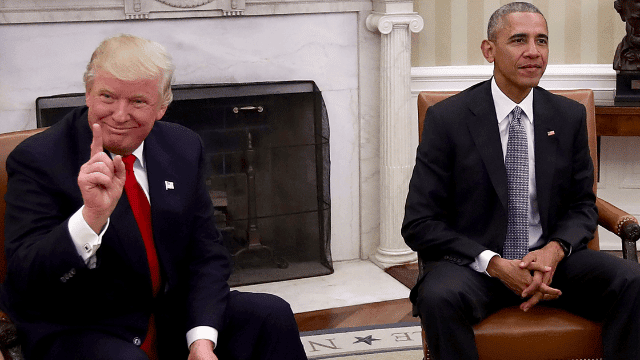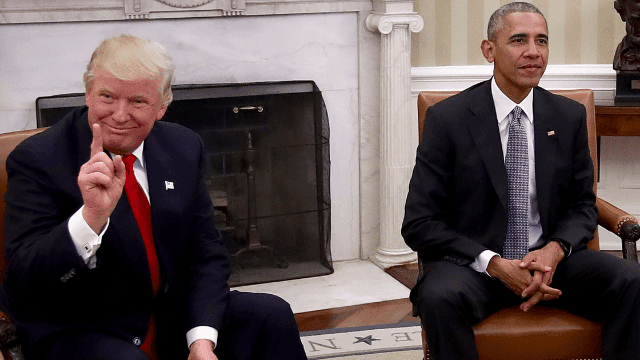Barack Obama’s chance for a transformative presidency ended when he bowed to Official Washington’s foreign-policy establishment of neocons and liberal interventionists and bought into the elitist notion that the American people should be guided by propaganda, not informed by facts.
Although he began his presidency by promising transparency, Obama instead undertook an unprecedented crackdown on national security whistleblowers, prosecuting more than all other presidents combined. Meanwhile, he authorized partial and misleading releases of information about key events. Instead of an informed public, his administration sought maximum propaganda advantage, such as with the Aug. 21, 2013 sarin gas attack outside Damascus, Syria, and with the July 17, 2014 shoot-down of Malaysia Airlines Flight 17 over eastern Ukraine.
But Obama’s anti-democratic approach to information, i.e., treating Americans like mushrooms in a darkened cellar, creates an opportunity for President-elect Donald Trump to do the opposite, reinvigorate US democracy by arming citizens with facts. By doing so, he also can counter his reputation as someone hostile to reality.
Once in office, Trump could use his power over pardons and commutations to reverse Obama’s punishment of truth-tellers – the likes of Chelsea Manning and Edward Snowden – and Trump can authorize as full a release of evidence about turning-point events as possible. There’s no justifiable reason for the US intelligence community to continue to withhold its assessments on the Syria-sarin case, which killed hundreds of civilians, or on the shoot-down of MH-17, which killed 298 people.
I’ve been told by intelligence sources that there is a great deal more evidence regarding each incident than the Obama administration has shared even with official inquiries, although holding back this information has allowed guilty parties to escape while sending investigators off in wrong directions. [See here and here.]
Instead of pursuing justice, the Obama administration exploited the atrocities to demonize geopolitical “enemies.” The sarin case was pinned on the Syrian government and the MH-17 shoot-down was blamed on Russian President Vladimir Putin – all the better to gin up the New Cold War and justify massive new armaments spending.
Official Washington’s foreign-policy establishment, aided and abetted by the mainstream US media, also concealed or played down other relevant facts about Syria and Ukraine. Regarding Syria, the Obama administration hid the degree of collaboration between US-backed “moderate” Syrian rebels and radical jihadists, including Al Qaeda’s affiliate, Nusra Front. On Ukraine, Obama concealed American complicity in the violent putsch that overthrew Ukraine’s elected President Viktor Yanukovych and threw Ukraine into a nasty civil war with the pro-US side relying on neo-Nazi storm troopers to kill ethnic Russian Ukrainians. Those realities had to be whitewashed because they didn’t reinforce the desired narrative.
Opening the Records
On his first day in office, President Trump could order his CIA Director Mike Pompeo to review these cases and release all information that does not compromise sensitive sources and methods. The order could extend to other intelligence-related mysteries, including some that may reflect poorly on Republicans such as the October Surprise mystery of 1980, whether Ronald Reagan’s campaign went behind President Jimmy Carter’s back to undermine his hostage negotiations with Iran and thus ensure Reagan’s election.
By demonstrating a readiness to tell it like it is – regardless of where the partisan chips fall – Trump could reassure nervous Democrats and progressives who view him as a demagogue who disdains facts and exploits emotions for political gain. He could reverse that negative image by doing what Obama promised – but failed to deliver on – a transparent government that trusts the people.
Trump also could put mainstream US media outlets in a bind since they would have to admit that much of what they have reported about Syria and Ukraine amounted to either propaganda or disinformation. As much as the big newspapers have decried Trump as a purveyor of “fake news,” they would have a hard time arguing against the release of information that gives Americans a fuller understanding of the world around them.
After opening up these intelligence files, Trump could explain why he believes neocon/liberal-hawk “regime change” strategies are unwise and how relations with Moscow could be improved based on a clear knowledge of what the Kremlin has and has not done, rather than a slanted and selective presentation of propaganda designed to manage the perceptions of the American people.
Advice to Obama
In early 2014, as the New Cold War was starting to heat up, I advocated for President Obama to find within himself the courage that Dwight Eisenhower and John Kennedy displayed when they explained real dangers that Americans faced from, respectively, the Military Industrial Complex and the demonizing of Moscow’s leaders in the pursuit of the original Cold War.
In a farewell address on Jan. 17, 1961, Eisenhower ominously warned that “In the councils of government, we must guard against the acquisition of unwarranted influence, whether sought or unsought, by the military-industrial complex. We must never let the weight of this combination endanger our liberties or democratic processes.”
On June 10, 1963, at American University in Washington, D.C., Kennedy outlined the need to collaborate with Soviet leaders to avert dangerous confrontations, like the Cuban Missile Crisis of 1962:
What kind of peace do I mean and what kind of a peace do we seek? Not a Pax Americana enforced on the world by American weapons of war. Not the peace of the grave or the security of the slave. I am talking about genuine peace, the kind of peace that makes life on earth worth living, and the kind that enables men and nations to grow, and to hope, and build a better life for their children, not merely peace for Americans but peace for all men and women, not merely peace in our time but peace in all time.
And then, in arguably the most important words that he ever spoke, Kennedy said, “For in the final analysis, our most basic common link is that we all inhabit this small planet. We all breathe the same air. We all cherish our children’s futures. And we are all mortal.”
But US presidents since then have opted for an expanded Military Industrial Complex, the demonization of “enemies” – and what the Reagan administration liked to call “perception management” of the American public. Rather than trusting the people as the true sovereigns of the nation, these US presidents saw the people as simpleminded beasts to be guided and controlled.
Obama’s Choice
Obama faced that test, too. Would he go over the heads of Washington’s elites and trust the people or would he keep the people in the dark and ally himself with the elites? Obama reached that crossroads in late 2013 and early 2014.
On March 14, 2014, I wrote: “With the neocons again ascendant and with the US news media again failing to describe a foreign crisis honestly, Barack Obama faces perhaps the greatest challenge of his presidency, a moment when he needs to find the courage to correct a false narrative that his own administration has spun regarding Ukraine and to explain why it’s crucial to cooperate with Russian President Vladimir Putin in the cause of world peace.”
But Obama couldn’t find the courage to rise to the occasion. Instead he relied on the strident language of aides such as his “humanitarian” warmongering Ambassador to the United Nations Samantha Power, and he stuck with the confrontational policies of neocon holdovers such as Assistant Secretary of State for European Affairs Victoria Nuland, an architect of the Ukraine coup.
Obama’s failure to stand up to this neocon/liberal-hawk foreign-policy elite over Syria and Ukraine may well define his historical legacy. He allowed the Syrian conflict to escalate with shipments of US weapons to rebels both directly and indirectly adding to the country’s carnage. Obama also acquiesced to the provocative overthrow of Ukraine’s elected president on Russia’s border and allowed the crisis to escalate into a risky stand-off with nuclear-armed Russia.
Rather than do what was best for the American people and the world, Obama sought to appease what’s often called Washington’s “war party,” apparently thinking that the neocons and liberal hawks would think better of him if he joined them in beating the war drums.
Now, ironically, it may fall to a man with only a fraction of Obama’s oratorical skills to pick up the torch for peace that Eisenhower and Kennedy raised in their two most important speeches.
However, even more important than giving a speech, Trump can give the American people the facts from which can be built a solid foundation for rational relationships with adversaries as well as allies.
Out of the Weeds
If the weeds of propaganda and “perception management” are cleared away, a Trump administration could move forward with plans to tackle the international problems that most tripped up Obama: Ukraine and the Middle East.
With Ukraine, President Trump could make clear he will not tolerate the Kiev regime continuing to drag its feet on the Minsk II peace accord that calls for granting ethnic Russians in eastern Ukraine some form of autonomy. The Crimea issue also could be resolved by arranging an internationally supervised referendum on whether the people want to be with Russia or Ukraine.
Regarding the Middle East, Trump could finally speak the truth – that Saudi Arabia and other Sunni-ruled Gulf states are the true prime sponsors of terrorism, not Iran. The Iran lie is a beloved Washington “group think” – favored by the powerful Israel Lobby – but the accusation is clearly not true.
Al Qaeda, Islamic State and other terror groups that have obsessed and bedeviled the West in recent decades are all Sunni and are backed by rich Sunni kingdoms and emirates, led by Saudi Arabia and Qatar.
If President Trump chooses to really level with the American people and truly wants to get to the root causes of terrorism, he will identify Saudi Arabia and its friends as state sponsors of terrorism and take appropriate actions to stop them.
Of course, if Trump does challenge Official Washington’s vested interests in protecting the wealthy Saudis who have built an influential anti-Shiite alliance with Israel, he will find few friends in the US capital. Which is why he must enlist the support of the American people by first empowering them with the truth and then rallying them to a policy that could make a difference.
Whether Trump has the courage and wisdom to pull off such a sharp break with the way Washington does business may determine whether he achieves his ambition to be a great president or simply presides over another failed presidency.
Reprinted with permission from ConsortiumNews.com.


